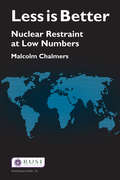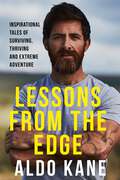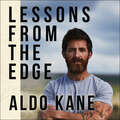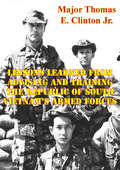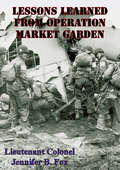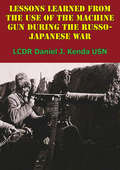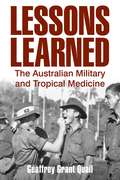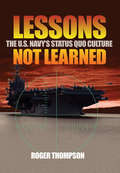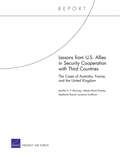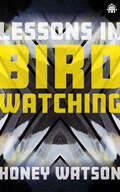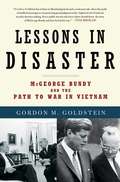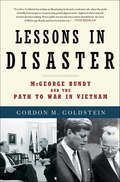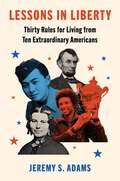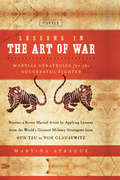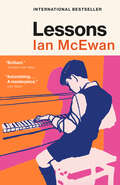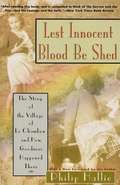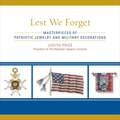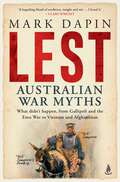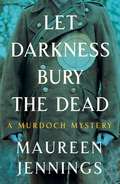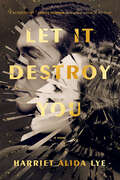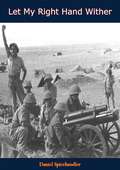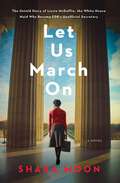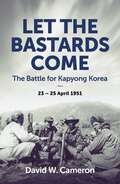- Table View
- List View
Less is Better: Nuclear Restraint at Low Numbers (Whitehall Papers)
by Malcolm ChalmersDespite the rise of ‘new’ security threats like terrorism, cyber-war and piracy, the terrible destructive power of nuclear weapons still hangs over the world. Discussion on further strategic nuclear arms reduction has tended to be dominated by the analysis of possible trade-offs between the US and Russia. But as the prospect of further cuts below ‘New START’ levels is contemplated, increasing attention needs to be paid to the possible shape of a new, multi-power approach to nuclear restraint. While restraint at low numbers goes with the grain of thinking in most nuclear states, correct sequencing will be vital. Using the New START framework, attention could initially be focused on incremental decreases in US and Russian stocks of the most dangerous weapons. Thereafter, the other nuclear powers would need to take steps to limit the size and capabilities of their own arsenals in a process of mutual reductions. If successful, the benefits would be wide ranging: successful restraint amongst existing nuclear-armed states could engender trust, as well as provide mechanisms for reducing the risks of rapid escalation in the event of limited conflict. Less is Better considers the various challenges and opportunities for ensuring restraint at low numbers in today’s complicated web of bilateral nuclear relationships and in the context of the debate on ‘Global Zero’.
Lessons From the Edge: Inspirational Tales of Surviving, Thriving and Extreme Adventure
by Aldo Kane'The thinking man's action hero' - The Times MagazineTrained Royal Marines Sniper, world record breaker and extreme TV adventurer, Aldo Kane is known for his ability to navigate and lead through challenging and pressured environments, whether it be abseiling into an erupting volcano in the Democratic Republic of Congo, rowing the Atlantic, getting locked in a bunker for 10 days with zero daylight, leading Steve Backshall into the jungle or being held at gunpoint...In his debut book, Lessons From The Edge, Aldo will inspire readers with his jaw-dropping stories and show them how to survive and thrive through sheer strength of mind and sharp decision-making. It will reveal how this tough military man was able to cope with suddenly feeling worthless, how he overcame doors literally slamming in his face, how he came to realise that you can't wait for things to happen and instead how he rediscovered his identity and harnessed his emotions to his advantage to find determination, purpose, and a renewed sense of belonging. And how, to use his own words, he became the captain of his own ship.Aldo is a firm believer that with the right head game, however hard it feels, you can get through anything life throws at you. Lessons From The Edge will inspire readers to find the spirit to do the things in life they've previously been too scared to tackle, build the courage to know that failure isn't the end, and the knowledge that the impossible can be made possible.
Lessons From the Edge: Inspirational Tales of Surviving, Thriving and Extreme Adventure
by Aldo Kane'The thinking man's action hero' - The Times MagazineTrained Royal Marines Sniper, world record breaker and extreme TV adventurer, Aldo Kane is known for his ability to navigate and lead through challenging and pressured environments, whether it be abseiling into an erupting volcano in the Democratic Republic of Congo, rowing the Atlantic, getting locked in a bunker for 10 days with zero daylight, leading Steve Backshall into the jungle or being held at gunpoint...In his debut audiobook, Lessons From The Edge, Aldo will inspire listeners with his jaw-dropping stories and show them how to survive and thrive through sheer strength of mind and sharp decision-making. It will reveal how this tough military man was able to cope with suddenly feeling worthless, how he overcame doors literally slamming in his face, how he came to realise that you can't wait for things to happen and instead how he rediscovered his identity and harnessed his emotions to his advantage to find determination, purpose, and a renewed sense of belonging. And how, to use his own words, he became the captain of his own ship.Aldo is a firm believer that with the right head game, however hard it feels, you can get through anything life throws at you. Lessons From The Edge will inspire listeners to find the spirit to do the things in life they've previously been too scared to tackle, build the courage to know that failure isn't the end, and the knowledge that the impossible can be made possible.(P) 2021 Hodder & Stoughton Limited
Lessons Learned From Advising And Training The Republic Of South Vietnam’s Armed Forces
by Major Thomas E. Clinton Jr. USMCThe United States (US) has a long history of employing military advisors, from the American military occupation of the Philippines throughout the 19th century, and the Korea War in the 1950s, the Vietnam War 1950 to 1973, El Salvador 1984 to 1992, to current efforts in Operation Enduring Freedom and Operation Iraqi Freedom (OIF). A strong Iraqi military is needed to support the future democratic government of Iraq. This will allow the US to disengage a large portion of its combat units from Iraq. The US must train the present Iraqi military to successfully take over responsibility for Iraq's security and combat the current insurgency. The US Army and Marine Corps combat advisors will play a key role in ensuring the Iraqi military is properly organized, trained, and equipped to provide for a secure Iraq. There are lessons learned from training and advising the Republic of South Vietnam's Armed Forces (RVNAF) during the Vietnam War 1950 to 1973 that could be applied in the ongoing advisory effort in Iraq. The focus of this thesis is to determine the lessons learned from selecting, training, and the organization of US Army and Marine Corps advisors during the Vietnam War.
Lessons Learned From Operation Market Garden
by Lieutenant Colonel Jennifer B. FoxOperation Market Garden was the largest paratroop drop of the Second World War; It was also one of the worst operational failures. What strategy could have led the Allies to such an incredulous failure and what lessons can be learned for future military operations? Several timeless lessons are apparent from an analysis of the operation: (1) at the strategic level, military planners must never lose sight of the political reasons which fostered the initial conflict; (2) at the operational level, total coordination and planning with all elements of an operation remain critical to the successful execution of any plan; (3) logistics shortages caused the troops to be ill prepared; (4) most importantly, at the tactical level commanders must learn to "read the troops," watch their collective behavior and be ready to step in to keep them focused on the ultimate goal, the satisfactory completion of the mission; (5) from a leadership perspective, we learn that truly great leaders sacrifice their personal ambitions for the good of the unit effort and the successful execution of the mission.
Lessons Learned From The Use Of The Machine Gun During The Russo-Japanese War
by LCDR Daniel J. KendaDr. Richard Gatling invented the world's first practical machine gun in 1862. Between that weapon and subsequent improved designs, the world's armies had roughly 50 years to adopt the machine gun and perfect its employment before it helped wreak the carnage of World War I. However, for some reason or combination of reasons, none of the armies of the day saw fit to do so. This thesis explores the potential explanations behind this phenomenon by using the Russo-Japanese War as a case study. The Russo-Japanese War should have demonstrated to the world how the machine gun fundamentally altered the conduct of land warfare, especially since the major world powers all sent military observers to report on the war's events. This thesis will show, however, that because of a complex combination of the prevalent military tactical culture, bureaucratic pragmatism and logistical concerns, the five major protagonist armies of World War I generally failed to apply the lessons they learned about machine-gun employment from the Russo-Japanese War and as a result were completely surprised by the weapon's impact on the battlefield ten years later.
Lessons Learned: The Australian Military and Tropical Medicine
by Geoffrey Grant QuailHistorically, prolonged campaigns have been frequently lost or won because of the greater fitness of one of the combatant armies. In the twentieth century, infection was still a major problem, leading to withdrawal from Gallipoli, and the near defeat of the Allies due to malaria early in the Second World War&’s Pacific campaign. Malaria emerged again as a major problem in the Vietnam War. The Australian Army Medical Corps, founded in 1901, learned from past medical experience. However, errors leading to significant morbidity did occur mainly in relation to malaria. These errors included lack of instruction of doctors sent to New Guinea with the Australian Force in the Great War, inadequate prophylactic measures against malaria in New Guinea early in World War Two, failure to perceive the threat of emerging resistant strains of malaria in the 1960s, and military commanders not fully implementing the recommendations of their medical advisers. Many Australian campaigns have taken place in tropical locations; a substantial amount of scientific work to prevent and manage tropical diseases has therefore been conducted by the Army Medical Corps&’ medical researchers—particularly in the Land Headquarters Medical Research Unit and the Army Malaria Institute. Their work extends well beyond the military, greatly improving health outcomes throughout the world. This book recognises the efforts of both.
Lessons Not Learned
by Roger ThompsonDespite its reputation as the most impressive naval force in the world, the U.S. Navy is in trouble, according to the author of this book, and systemic weaknesses could be its undoing. Here, military sociologist Roger Thompson provides a compelling, often scathing, assessment of the U.S. Navy and its learning disabilities and then presents a convincing argument for reform.Thompson points to the U.S. Navy's "up or out" promotion system, massive personnel turnover, inexperienced crews, and drug and alcohol abuse as problems that make it difficult for the Navy to build cohesive, well-trained fighting units. In a review of the Navy's recent history, he finds that its ships, submarines, and aircraft are often outperformed in competitions and exercises with other navies-and its failures are either denied altogether or perfunctorily excused. Diesel submarines-so quiet that they are rarely detected until it's too late to prevent an attack-routinely surpass expensive U.S. nuclear subs and put U.S. aircraft carriers in danger. American naval pilots, whose weapons are often improperly tested, are frequently bested by military pilots from other countries. Because the U.S. Navy doesn't have enough surface ships to protect its capital ships, American carrier strike groups now use Canadian ships as escorts. Shortcomings like these, Thompson argues, undermine the Navy's potential and should be cause for national concern.In presenting a side of the U.S. Navy that's rarely discussed, this book spells out lessons the Navy must learn if it is going to succeed in an era of asymmetrical warfare-of David-versus-Goliath conflicts. In his conclusion, the author puts forth a twelve-step program that calls on the U.S. Navy to rethink its naval strategy, to lose some weight, and to focus on the fundamentals.
Lessons from Russia's Operations in Crimea and Eastern Ukraine
by Andrew Radin Brian Nichiporuk Jenny Oberholtzer Katya Migacheva Michael Kofman TkachevaThis report assesses the annexation of Crimea by Russia (February–March 2014) and the early phases of political mobilization and combat operations in Eastern Ukraine (late February–late May 2014). It examines Russia’s approach, draws inferences from Moscow’s intentions, and evaluates the likelihood of such methods being used again elsewhere.
Lessons from U.S. Allies in Security Cooperation with Third Countries: The Cases of Australia, France, and the United Kingdom
by Laurence Smallman Jennifer D. P. Moroney Celeste Ward Gventer Stephanie PezardSeveral key U. S. allies engage in security cooperation, albeit on a smaller scale than the United States. To see what the U. S. Air Force can learn from these efforts, the authors examined how and why threeallies--Australia, France, and the United Kingdom--provide security cooperation and highlight three key areas that could benefit from further collaboration: staff talks, exercises, and training followed by exercises.
Lessons in Birdwatching
by Honey WatsonA smart sci-fi epic interwoven with political intrigue; set on a dystopian world ravaged by a time-plague where a brutal murder will start a civil war. Perfect for fans of Dune, A Memory Called Empire and Ninefox Gambit.During their temporary research post on Apech – a planet ravaged by a time distorting illness – Wilhelmina Ming and four other elite students of the Crysthian empire have witnessed such illogical brutality that they&’ve resorted to psychedelic antidepressants and group sex to take the edge off. After a night of indulgence following a gruesome execution, they wake to find an oblique warning in the form of an impaled corpse dangling from the exterior of their residence.When their subsequent investigation uncovers a web of collusion and conspiracy in the ranks of their own diplomatic corps, the envoys find themselves caught in the middle of a bloody civil war. As bodies pile up above ground, a deranged fanatic stokes an existential threat below, coaxing the embers of a forgotten god, and its temporal virus, to life.File Under: Science Fiction [ Timing is all | Amateur heroics | Body of God | Birdsong ]
Lessons in Disaster: McGeorge Bundy and the Path to War in Vietnam
by Gordon M. GoldsteinInteresting book about Bundy and the decisions made on whether or not to send troops into Vietnam.
Lessons in Disaster: McGeorge Bundy and the Path to War in Vietnam
by Gordon M. GoldsteinA revelatory look at the decisions that led to the US involvement in Vietnam, drawing on the insights and reassessments of one of the war’s architects.A Foreign Affairs BestsellerIn the last years of his life, the former US national security adviser McGeorge Bundy decided to revisit the role he played in leading the nation into the Vietnam War as a counselor to Presidents John F. Kennedy and Lyndon B. Johnson. “I had part in a great failure,” he said. “If I have learned anything I should share it.”In this original and provocative work, the political scientist Gordon M. Goldstein draws on his prodigious research as well as interviews and analysis he conducted with Bundy before his death in 1996 to distill the essential lessons of America’s involvement in Vietnam. Lessons in Disaster is a historical tour de force on the uses and misuses of American power.“Gordon Goldstein has written an illuminating book and a cautionary tale about the perils of intellectual arrogance overpowering good judgment at the highest levels of national security decision making. Every public servant and every citizen should know the story of McGeorge Bundy and how he lost his way.” —Tom Brokaw“A compelling portrait of a man once serenely confident, searching decades later for self-understanding.” —Richard Holbrooke, The New York Times Book Review
Lessons in Liberty: Thirty Rules for Living from Ten Extraordinary Americans
by Jeremy S. Adams“Smart, patriotic, and readable, this book is what our cynical culture needs.” — Pete Hegseth, #1 New York Times bestselling author of Battle for the American MindAmerica is full of inspiring heroes.Greatness is not a chance—it is a choice. George Washington didn’t simply wake up as one of the greatest men in human history. His greatness was the sum of a lifetime of difficult and consequential choices.In Lessons in Liberty, Jeremy S. Adams distills inspiring advice from the lives of extraordinary Americans from our past.George Washington’s lifelong struggle to conquer his temper makes him a model for self-help and self-improvement.Daniel Inouye was a beloved Japanese American senator who carried out daring missions in World War II, despite being subjected to discrimination by the very nation he decided to defend.Eleven-year-old Clara Barton’s role in nursing her injured brother back to health instilled the courage and ferocity that would later empower her to pioneer new nursing techniques during the Civil War.Adams has been an educator for more than a quarter century. Teaching a new generation of students who suffer with anxiety, passivity, and a cynical view of their own nation and its principles has convinced him that a change is urgently needed: The recovery of national greatness requires that we passionately study our heroes. Lessons in Liberty is the first step to discovering the better angels of our nature by restoring the possibilities of individual freedom.In this beautifully written, proudly patriotic, and deeply researched ode to American heroes from a rich variety of eras and backgrounds, Adams reclaims the power of the American story, discovering thirty different and surprising lessons that will inspire modern Americans to lead better and more substantive lives.
Lessons in the Art of War
by Martina SpragueWar is a human activity, not one that is limited by geographic location. And the principles of war are the same, regardless of place or number of participants. An army of ten thousand engaged in battle uses the same basic strategies that two people in single combat will utilize.In Lessons in the Art of War, author Martina Sprague explores the writings of both Sun Tzu, the famous Chinese military strategist, and Carl von Clausewitz, the European military genius. Despite the differences in time period, geographic location and culture, both Sun Tzu and von Clausewitz had achieved extraordinary understanding of human nature and how that relates to combat. Sprague takes the similarities and differences in their respective strategies and distills them down to their essence for martial artists to understand and incorporate into their personal practices.
Lessons in the Art of War
by Martina SpragueWar is a human activity, not one that is limited by geographic location. And the principles of war are the same, regardless of place or number of participants. An army of ten thousand engaged in battle uses the same basic strategies that two people in single combat will utilize.In Lessons in the Art of War, author Martina Sprague explores the writings of both Sun Tzu, the famous Chinese military strategist, and Carl von Clausewitz, the European military genius. Despite the differences in time period, geographic location and culture, both Sun Tzu and von Clausewitz had achieved extraordinary understanding of human nature and how that relates to combat. Sprague takes the similarities and differences in their respective strategies and distills them down to their essence for martial artists to understand and incorporate into their personal practices.
Lessons: A Novel
by Ian McEwanBoth epic and intimate, the story of one man&’s life across generations and historical upheavals: a deeply affecting novel about love, loss, ambition, and resolution—from #1 bestselling author Ian McEwan.When the world is still counting the cost of the Second World War and the Iron Curtain has closed, eleven-year-old Roland Baines&’s life is turned upside down. 2,000 miles from his mother&’s protective love, stranded at an unusual boarding school, his vulnerability attracts piano teacher Miss Miriam Cornell, leaving scars as well as a memory of love that will never fade.Now, when his wife vanishes, leaving him alone with his tiny son, Roland is forced to confront the reality of his restless existence. As the radiation from Chernobyl spreads across Europe, he begins a search for answers that looks deep into his family history and will last for the rest of his life.From the Suez Crisis to the Cuban Missile Crisis, the fall of the Berlin Wall to the current pandemic and climate change, Roland sometimes rides with the tide of history, but more often struggles against it. Haunted by lost opportunities, he seeks solace through every possible means—music, literature, friends, sex, politics and, finally, love cut tragically short, then love ultimately redeemed. His journey raises important questions for us all. Can we take full charge of the course of our lives without damage to others? How do global events beyond our control shape our lives and our memories? And what can we really learn from the traumas of the past?Epic, mesmerising and deeply humane, Lessons is a chronicle for our times—a powerful meditation on history and humanity through the prism of one man&’s lifetime.
Lest Innocent Blood Be Shed: The Story Of The Village Of Le Chambon And How Goodness Happened
by Philip P. HallieDuring the most terrible years of World War II, when inhumanity and political insanity held most of the world in their grip and the Nazi domination of Europe seemed irrevocable and unchallenged, a miraculous event took place in a small Protestant town in southern France called Le Chambon. There, quietly, peacefully, and in full view of the Vichy government and a nearby division of the Nazi SS, Le Chambon's villagers and their clergy organized to save thousands of Jewish children and adults from certain death.
Lest We Forget: Masterpieces of Patriotic Jewelry and Military Decorations
by Judith PriceSince ancient times, memorable moments of military history have been commemorated with jewelry, medals, and symbolic accessories. In Lest We Forget: Masterpieces of Patriotic Jewelry and Military Decorations, Judith Price illuminates iconic military objects, exploring their origins and documenting their place in history. The dramatic compilation of patriotic jewelry and decorations presented in Price&’s sixth book tells a truly dazzling story of Western historical conflict and resolution.Lest We Forget serves as a stunning tribute to our men and women in service both past and present. This book derives its title from the poem &“Recessional&” by Rudyard Kipling, often used as a tribute in war memorials, while its contents chronicle our military history since the Revolution through 150 iconic artifacts. It showcases such diverse items as the Washington Peace Medals to the Indians, the earliest Medals of Honor, Civil War Corps badges, British military decorations, and historic French treasures. Drawn from leading world museums and private collections such as the British Museum, the West Point Museum, the Musée de l&’Armée, and the Imperial War Museum, the objects depicted in this book movingly recall the role of decorations and jewelry in commemorating war and peace.
Lest: Australian War Myths
by Mark DapinFrom Simpson&’s donkey and the Emu War to Vietnam and Ben Roberts-Smith, Australian military history is full of events that didn&’t happen the way most people think they did. In his inimitable style, award-winning author Mark Dapin sets the record straight. Australia has many stories and statues &‘lest we forget&’ our military past. But from Simpson&’s donkey to Ben Roberts-Smith, our history is full of events that didn&’t happen the way most people think they did. The first Anzac Day, for example, was far from being a solemn march – it was a celebration where people dressed as cavemen and dinosaurs, among other things. And is it true that British officers callously dispatched Australian soldiers to their deaths in the Dardanelles, as we&’ve been told? Did we really hate the soldiers returning from Vietnam? Were the white-feather women of the First World War fact or fiction? In his inimitable style, award-winning author and historian Mark Dapin sets the record straight, showing that the reality was often completely different from the myth – and that in celebrating the wrong people we often overlook the real heroes. &‘With Lest, Mark Dapin transforms his trademark humour into serious history … It forces us to look again at stories we think we all know – or should know – and reframe them with intellectual rectitude and rigour … Lest offers new perspectives on the past from one of Australia&’s most interesting and provocative thinkers.&’ Clare Wright
Let Darkness Bury the Dead
by Maureen JenningsCanada's premier author of historical mystery fiction returns with a brand new and highly anticipated Murdoch Mystery, with an older and wiser Detective Murdoch.It is November 1917. The Great War is grinding on, chewing up young men by the thousands. Initially, in the loyal Dominion of Canada, people are mostly eager to support the Motherland and fight for the Empire. Men perceived as slackers or cowards are shunned. But the carnage is horrendous and with enforced conscription, the enthusiasm for war is dimming. William Murdoch is a widower, a senior detective who, thanks to the new temperance laws, spends his time tracking down bootleggers and tipplers; most unsatisfying. His wife, Amy, died giving birth to their second child, a girl who lived only a few hours more. Murdoch, racked by grief, withdrew from four-year-old, Jack. This he regrets and would dearly love to make up for his negligence. As we enter the story, Jack, now twenty-one, has returned from France after being wounded and gassed at the Battle of Passchendaele. It is soon apparent that he is deeply troubled but he's not confiding in his father. He does, however, seem to be bound by shared secrets to another wounded former soldier, Percy McKinnon. Murdoch suddenly has much more serious crimes than rum-running on his hands. The night after Jack and McKinnon arrive home, a young man is found stabbed to death in the impoverished area of Toronto known as the Ward. Soon after, Murdoch has to deal with a tragic suicide, also a young man. Two more murders follow in quick succession. The only common denominator is that all of the men were exempted from conscription. Increasingly worried that Jack knows more than he is letting on, Murdoch must solve these crimes before more innocents lose their lives. It is a solution that will give him only sorrow.
Let It Destroy You: A Novel
by Harriet Alida LyeInspired by the true story of a dangerous atomic weapon and the man who designed it, here is a stunning novel of morality, creation, and loss from the acclaimed author of The Honey Farm and Natural Killer.It is August 12, 1945. Tomorrow, August Snow will be tried at the International War Crimes Court for patenting a more lethal variation on the atomic bomb. He invented a radiation machine to cure his young daughter&’s cancer, despite knowing that the very same technology was capable of great destruction, and inevitably profited from disaster. But are his intentions relevant when the fate of the world is at stake?August&’s former wife, June, will also attend the hearing. Restless in her Hague hotel room the night before, she keeps watch over their daughter and reflects on the events that brought them here. She had nothing to do with making the bomb. But is she innocent? Wouldn&’t any wife and mother have done the same thing in her shoes? And now, will it cost her everything?Inspired by the physicist Leó Szilárd and the letters he wrote his wife, Gertrud "Trude" Weiss, Let It Destroy You is told in parallel narratives and ventures from Budapest to Berlin to Colorado, and back to Europe. It is a love story about two people whose destinies are bound by everything they share, and all that they&’ve kept from one another. Above all, it is a testament to the logic-defying love of a parent who will stop at nothing to protect their child.
Let My Right Hand Wither
by Daniel SpicehandlerA memoir of the first Arab-Israeli War in 1948 by an American veteran of that conflict and World War Two.“I have tried through my own experiences, first as a G.I. student at the Hebrew University in Jerusalem, and later as a volunteer in the defense of Israel, to depict the life in Israel during the past few crucial years. I have tried to describe the many tremendous changes embroidered in the one major transformation of Palestine, 1946, to Israel, 1949. The underground struggle, the life in the cities and farm communities, the constant preparation for the eventuality of a war which every Jew in Palestine knew was inevitable, the early struggle against local Arab gangs, and finally, the struggle against the seven invading Arab armies.The events in this book are true.Through the events that my wife, some friends and myself, all Americans, have participated in, I have tried to paint a picture of the rebirth of Israel, spiritually as well as physically. And I have taken the liberty of injecting, throughout the text, small incidents in which I had no active part, but of which I have heard or read. These incidents typify the fighting and living in Israel during these fateful years. They are included in the hope that they will contribute to a better understanding of the new Jew, the Sabra, who is growing up with Israel.The American reader, I am sure, will notice the close resemblance of the youth of Israel to his own youth. The former G.I. will be amazed to see how closely the “Palmachnick” resembles him in the last war. And the scene of Palestine, and later Israel, as a frontier country, will remind Americans of the struggle America once had in its fight for independence.”—From the Introduction.
Let Us March On: A Novel
by Shara MoonDevoted wife, White House maid, reluctant activist…A stirring novel inspired by the life of an unsung heroine, and real-life crusader, Lizzie McDuffie, who as a maid in FDR’s White House spearheaded the Civil Rights movement of her time.I’m just a college-educated Southerner with a passion for books. My husband says I’m too bold, too sharp, too unrelenting. Others say I helped spearhead the Civil Rights movement of our time. President Roosevelt says I’m too spunky and spirited for my own good.Who am I?I am Elizabeth “Lizzie” McDuffie. And this is my story…When Lizzie McDuffie, maid to Eleanor and Franklin D. Roosevelt, boldly proclaimed herself FDR’s “Secretary-On-Colored-People’s-Affairs,” she became more than just a maid—she became the President’s eyes and ears into the Black community. After joining the White House to work alongside her husband, FDR’s personal valet, Lizzie managed to become completely indispensable to the Roosevelt family. Never shy about pointing out injustices, she advocated for the needs and rights of her fellow African Americans when those in the White House blocked access to the President.Following the life of Lizzie McDuffie throughout her time in the White House as she championed the rights of everyday Americans and provided access to the most powerful man in the country, Let Us March On looks at the unsung and courageous crusader who is finally getting the recognition she so richly deserves.
Let the Bastards Come: The Battle for Kapyong Korea, 23 – 25 April 1951
by David W. CameronAnzac Day 2024 represents the 73rd anniversary of the critical battle of Kapyong (23 to 25 April 1951) This book for the first time tells the full story of the Australian, Canadian, New Zealand and American units involved. Fewer than 1,000 Australian and Canadian infantrymen, supported by New Zealand artillery and 15 American Sherman tanks fought off an entire Chinese Division of over 12,000 men and contributed significantly to defeating the great Chinese August offensive. The battle of Kapyong was fought during a heavy downpour in mountainous terrain, with Chinese units infiltrating the Australian lines which extended for seven kilometres. Given the small number of men involved and the long defensive line, several strong points were quickly established. The Australians almost alone, but with support from New Zealand gunners and some American tanks, for the first 24 hours held back the Chinese and were at times surrounded by large numbers of Chinese who launched ongoing human wave attacks against their isolated positions — but the line held with Australians leading bayonet counter charges against the Chinese. Within 24 hours, Canadian troops were committed to the battle and for 12 hours also faced significant attempts by the Chinese to surround their position – they too held their ground. The battle of Kapyong was truly a decisive battle of the Korean War, and for their heroic actions during the battle of Kapyong, the Australian and Canadian infantrymen and American tankers were awarded a rare US Presidential Unit citation.
